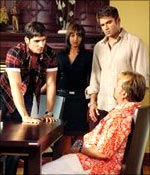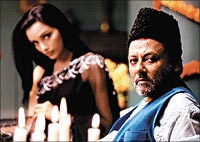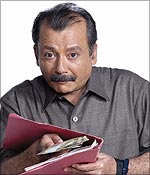 | « Back to article | Print this article |
One of India's finest actors, Pankaj Kapur is seen more on the small screen with his Office Office than wowing us with a Maqbool. Yet, the actor seems quite content.
The veteran spoke to Raja Sen about his latest release, the upcoming Blue Umbrella. But after elaborating on his character in that National Award-winning film, the actor fascinatingly held forth on cinema and acting at large. Excerpts:
Don't Miss: Part I of the interview, 'Blue Umbrella is not just for children'
This is a character with several nuances and eccentricities. When you consider a role, what excites you as an actor?
It has always excited me to play different kinds of parts. The richer the character is, the more I get an opportunity to dig into it, and the more satisfied I am as an actor. If the part is rather surfacial, one-dimensional or if the dimensions are only in talk but not in deed or action, then it becomes false to me. But if all that is dealt with in terms of screenplay and storytelling, then it becomes a complete human being that you are trying to portray.
My attempt as an actor has always been to play a person who you make alive on screen, and within that period, try and create as many ingredients of that human being's personality as you can to make that character complete.
My theory is that performance -- as an actor, because I am primarily an actor -- is like a miniature painting. When you see it from a distance, you may not be able to see the smaller strokes the painter has made, but from a distance it gives you a complete picture. And when you go closer to it, you realise how many little, little strokes the painter has made to make it look so complete from a distance. So if you do add the little strokes, the audience will be able to see a complete human being rather than a sketchy or surfacial portrait of maybe a kind of human being who might exist somewhere.
You do commercial cinema very rarely. But then after a film like Maqbool you go ahead and do a Dus. Now how does a role like that compare to your repertoire? Or do you merely look at is as a fun assignment?
 As far as Dus is concerned, I think it was a fairly etched character. Excepting the end development of the character, about which I had a series of discussions with the director [Anubhav Sinha] about where he is taking the character eventually. At the end of the day, it's the director's call. As an actor I can only suggest, discuss and leave it to him.
As far as Dus is concerned, I think it was a fairly etched character. Excepting the end development of the character, about which I had a series of discussions with the director [Anubhav Sinha] about where he is taking the character eventually. At the end of the day, it's the director's call. As an actor I can only suggest, discuss and leave it to him.
To me, whether I am playing a part in commercial cinema or, if you'd like to call it, middle-stream cinema, my attempt is the same. It depends on how the circumstances of the director permit him to understand what one is pointing out to him and incorporate the same into the script or not.
And sometimes even the best efforts of the director and actor may not sketch out the way you would imagine them to be for various constraints, but then you have to live with the kind of world you are in. And you tell yourself, 'Okay, there would be a Maqbool, a Blue Umbrella, but there would be a couple of commercial films as well.' And the idea of doing those films is to reach a certain audience that maybe does not, in the immediacy of time, watch a Blue Umbrella. For them, it is to make them aware that I exist in that cinema as well, so that maybe at some point in life they sit up and say 'oh, the same actor is there in this film, lets go and have a look at it.' So it is to maybe, partially increase the number of people who watch your work in the other kind of cinema.
Are there any feelings of disillusionment toward cinema on your part? You've done very little masala Bollywood compared to your colleagues...
First of all, I work only on a bound script. I do not go on just ideas and my scenes being given to me; I cannot work like that. So in the earlier stages of my career a lot of people were put off by that. It is only in the last four or five years that people have started approaching actors with bound scripts and explaining what they want to make. You need to read the entire script. I am a great believer in the fact that unless I have the complete text in front of me, I cannot work on my part because I need to know where this character stands in the entirety of the project. I also need to understand what the director is trying to say in this text, and how I, as an actor, can portray the part in order to best help the interpretation of what he wants to say to his audience.
The other reason is that while there have been a lot of offers, most have been very surfacial. In the last 15-20 years of cinema, can you pick out 10 characters and say 'Yeah, this is one I would have liked to do'? They are all personality-based characters; they are not human beings. I am interested in playing human beings. If that human being is a personality, so be it. Like in Maqbool, it was fine. But give me a human being to play.
 So when they can't create humans they create personalities, and then they cannot think of me as an actor for that, because they don't feel that I can create a personality. I think it is only after Maqbool that people have started feeling that 'Oh, oh yes, even he can create a personality.' Seriously speaking. That is the understanding that most people have of acting and characters.
So when they can't create humans they create personalities, and then they cannot think of me as an actor for that, because they don't feel that I can create a personality. I think it is only after Maqbool that people have started feeling that 'Oh, oh yes, even he can create a personality.' Seriously speaking. That is the understanding that most people have of acting and characters.
So the audiences need to see the characters as larger than life?
No, not the audiences.
Then who needs that?
The filmmaker. It is their conditioning over the last 60-70 years since cinema started in India. They want to see things larger than life whereas its been quite some time -- I am glad that people are waking up to such facts now -- that those personality based films are no longer hitting the audiences as they were 25 years back. People are exposed to 100 channels on television, to the Internet, and there are computers all over.
80 percent of India is watching the entire world, even if it is only the educated classes and the youngsters who are doing so. But they are, and it has affected the thinking of the audiences somewhere. I won't say audiences totally reject these [personality based] films; if it is crafted well they still accept it, as a 'style.' But by and large, it's not something they relate to. So to relate your cinema to them, you must make it more real.
I'm not against entertainment, I'm all for it. I'm not against songs in our cinema. It's a part of our culture. Use them well, use them in telling your story. But not just for the sake of having a song in the film, a number in the film. For the sake of a couple of good dialogues or creating a twisted character, the kind we don't usually see in normal life. Make a film and call it a fantasy, nobody says no, but then don't try and call it real.
I don't blame writers so much, because whenever the writer suggests something the directors dictate terms to them. 'This is not right, this doesn't work, this is what works and this is how you should work on your subjects.' So in that kind of scenario it becomes very difficult for any writer to come up with some really, genuinely interested characters.
 And my belief is -- and it has been tested by time as well, though through television more than cinema; I have always played different characters on television as well, and they have worked not because of great marketting, and not because it's a saas-bahu show -- that you need some kind of reality which is played correctly and made correctly, for your audiences to relate to. With entertainment, for sure. With the current trends of presentation and marketing, sure. They are an inherent part of our existence today. But it is basically about what kind of content you pick up, and what kind of characters you choose to deliver that content.
And my belief is -- and it has been tested by time as well, though through television more than cinema; I have always played different characters on television as well, and they have worked not because of great marketting, and not because it's a saas-bahu show -- that you need some kind of reality which is played correctly and made correctly, for your audiences to relate to. With entertainment, for sure. With the current trends of presentation and marketing, sure. They are an inherent part of our existence today. But it is basically about what kind of content you pick up, and what kind of characters you choose to deliver that content.
Coming to your television work, the characters there, iconic as they may be, seem relatively less textured than those featured in your cinema...
Sure they are. Simply because television, I always believed, has been forced to become mediocre by the circumstance in which it exists. By the insecurity of the producers, by the lack of surety of the channels, by the power the channels enjoy over the producers. The way terms are dictated, it has been reduced to a management thing now, rather than any creative thing.
But if you look at the earlier years of television, say the first 10-15 years of Indian television, we had some marvellous work which was done.
Don't Miss: Part I of the interview, 'Blue Umbrella is not just for children'